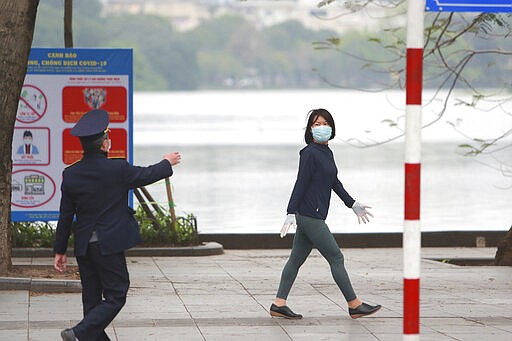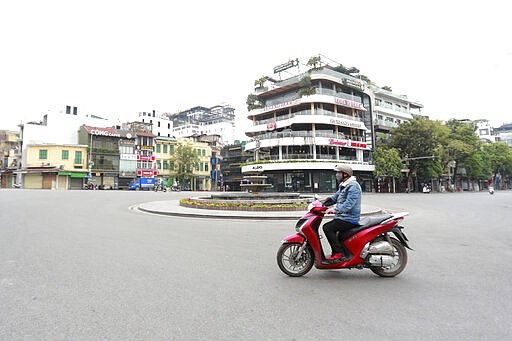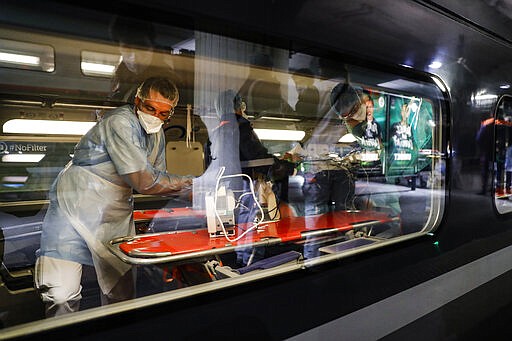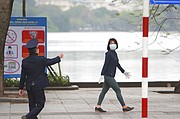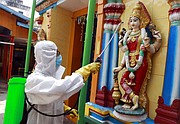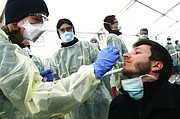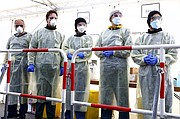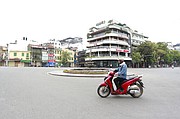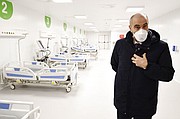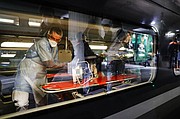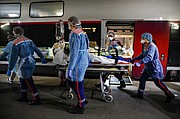Europe faces ICU crunch, rushes to build field hospitals
Nicole Winfield | Hagadone News Network | UPDATED 5 years, 10 months AGO
ROME (AP) — Facing intense surges in the need for hospital ICU beds, European nations are on a building and hiring spree, throwing together makeshift hospitals and shipping coronavirus patients out of overwhelmed cities via high-speed trains and military jets. The key question is whether they will be able to find enough healthy medical staff to make it all work.
Even as the virus has slowed its growth in overwhelmed Italy and in China, where it first emerged, hospitals in Spain and France are reaching their breaking points and the U.S. and Britain are bracing for incoming waves of desperately ill people.
"It feels like we are in a third world country. We don't have enough masks, enough protective equipment, and by the end of the week we might be in need of more medication too,” said Paris emergency worker Christophe Prudhomme.
In a remarkable turnaround, rich economies where virus cases have exploded are welcoming help from less wealthy ones. Russia sent medical equipment and masks to the U.S. on Wednesday. Cuba sent doctors to France. Turkey sent masks, hazmat suits, goggles and disinfectants to Italy and Spain.
London is just days from unveiling a 4,000-bed temporary hospital built in a massive convention center to take non-critical patients so British hospitals can keep ahead of an expected surge in demand. Still, there are concerns about finding thousands of medical workers to run it.
Spain, which hit a new record Wednesday of 864 deaths in one day, has boosted its hospital beds by 20%. Hotspots in Madrid and northeast Catalonia have almost tripled their ICU capacity. Dozens of hotels across Spain have been turned into recovery rooms, and authorities are building field hospitals in sports centers, libraries and exhibition halls.
Intensive care units are particularly crucial in a pandemic in which tens of thousands of patients descend into acute respiratory distress. Those ICU units are much harder to cobble together quickly than standard hospital beds.
Milan opened an intensive care field hospital Tuesday at the city fairgrounds, complete with a pharmacy and radiology wards. It expects to eventually employ 900 staff. The move came after the health situation turned extreme in Italy's Lombardy region, where bodies overflowed in morgues, caskets piled up in churches and doctors were forced to decide which desperately ill patient would get a breathing machine.
“We aren’t happy to have done this,” fairgrounds foundation head Enrico Pazzali said. “It's something I never would have wanted to do.”
The pressure is easing on hard-hit Italian cities like Bergamo and Brescia as the rate of new infections in Italy slows. Yet many Italians are still dying at home or in nursing homes because hospitals are saturated and they could not get access to ICU breathing machines.
With over 12,400 dead so far, Italy has the most coronavirus deaths of any nation.
Italy, Britain and France are among countries that have called in medical students, retired doctors and even laid-off flight attendants with first aid training to help, although all need re-training.
The medical staffing shortage has been exacerbated by the high numbers of infected personnel. In Italy alone, nearly 10,000 medical workers have been infected and more than 60 doctors have died.
While Spain's confirmed infections shot past 102,000 Wednesday and its deaths are now beyond 9,000, the increase in infections was less than the previous day, offering some hope that the contagion rate is stabilizing.
Still, COVID-19 patients who need intensive care can occupy a bed for three to four weeks, meaning Spain and other nations will still see increasing pressures on their hospitals for days or weeks to come.
The Paris region more than doubled its ICU capacity over the past week – but the beds are already full. So Paris was sending critically ill patients to less-saturated regions on special high-speed trains Wednesday. Others have been moved by military planes, helicopters or warships.
One reason Germany is in better shape than other European countries is its high proportion of ICU beds, at 33.9 per 100,000 people, compared to 8.6 in Italy. Germany has 775 virus deaths, 16 times fewer deaths than Italy.
Britain still has some free ICU beds available, but the outbreak is likely weeks away from its peak there and the U.K. has one of the lowest number of hospital beds per capita in Europe. The new hospital inside London’s Excel center plans to admit its first patients at the end of this week. Chief operating officer Natalie Forrest warned that it will need thousands of doctors, nurses and volunteers.
“The numbers are scary,” she said.
For most people, the coronavirus causes mild or moderate symptoms, such as fever and cough. But for others, especially older adults and people with existing health problems, it can cause severe symptoms like pneumonia and lead to death.
U.S. health authorities warned the number of dead could reach up to 240,000 even with social distancing measures in place as the New York region also rushed to set up extra hospital capacity.
A 1,000-bed emergency hospital at the mammoth Javits Convention Center began taking non-coronavirus patients on Tuesday to help relieve the city's overwhelmed health system. A Navy hospital ship was expected to accept patients soon, and the indoor tennis center that hosts the U.S. Open is being turned into a hospital.
“I want every American to be prepared for the hard days that lie ahead,” President Donald Trump said Tuesday after he extended social distancing guidelines until April 30. “We're going to go through a very tough two weeks.”
The U.S. recorded a big daily jump of 26,000 new cases, bringing its total infections to more than 189,000, the highest in the world. The U.S. death toll leapt to over 4,000, and refrigerated morgue trucks parked on New York streets to collect the dead.
Worldwide, more than 860,000 people have been confirmed infected and over 42,000 have died, according to a tally kept by Johns Hopkins University. Italy and Spain accounted for half of all the deaths. Everywhere, the real figures are believed to be much higher due to issues in counting infections and deaths.
China, where the outbreak began late last year, on Wednesday reported just 36 new COVID-19 cases.
Some people have chosen to ignore social distancing guidelines. In Louisiana, buses and cars filled a church parking lot Tuesday as worshippers flocked to hear a pastor who is facing charges for holding services despite a ban on gatherings. A few protesters also showed up at the Life Tabernacle Church, including one with a sign that read: “God don't like stupid."
Two ships carrying passengers and crew from an ill-fated South American cruise are urging Florida officials to let them dock. Four people aboard with the virus have died and nine have tested positive. Trump said, for humanitarian reasons, Florida should do so.
___
Charlton reported from Paris. Associated Press writers around the world contributed to this report including Joseph Wilson in Barcelona; Danica Kirka and Jill Lawless in London; Karen Matthews in New York; and Nick Perry in Wellington, New Zealand.
___
Follow AP news coverage of the coronavirus pandemic at https://apnews.com/VirusOutbreak and https://apnews.com/UnderstandingtheOutbreak
ARTICLES BY NICOLE WINFIELD
Your suffering is ours: Pope honors Slovak Holocaust victims
BRATISLAVA, Slovakia (AP) — Pope Francis honored Slovakian Holocaust victims and atoned for Christian complicity in wartime crimes as he sought to promote reconciliation Monday in a country where a Catholic priest was president of a Nazi puppet state that deported tens of thousands of its Jews.
Pope to Orban's Hungary: Open your arms to everyone
BUDAPEST, Hungary (AP) — Pope Francis urged Hungary on Sunday to “extend its arms towards everyone,” in a veiled critique of Prime Minister Viktor Orban’s anti-migrant policies, as the pontiff opened a four-day visit to Central Europe in his first big international outing since undergoing intestinal surgery in July.
Your suffering is ours: Pope honors Slovak Holocaust victims
BRATISLAVA, Slovakia (AP) — Pope Francis honored Slovakian Holocaust victims and atoned for Christian complicity in wartime crimes as he sought to promote reconciliation Monday in a country where a Catholic priest was president of a Nazi puppet state that deported tens of thousands of its Jews.




